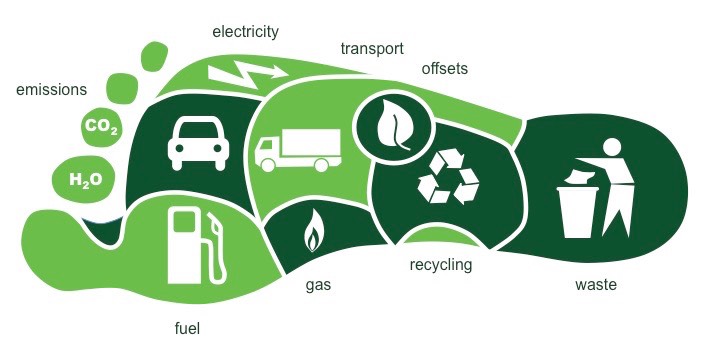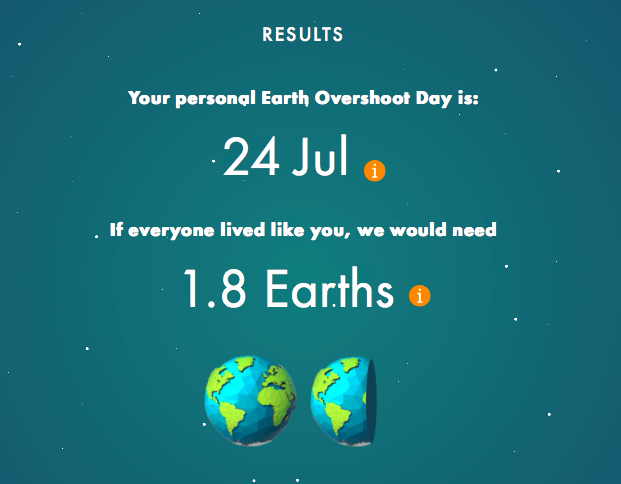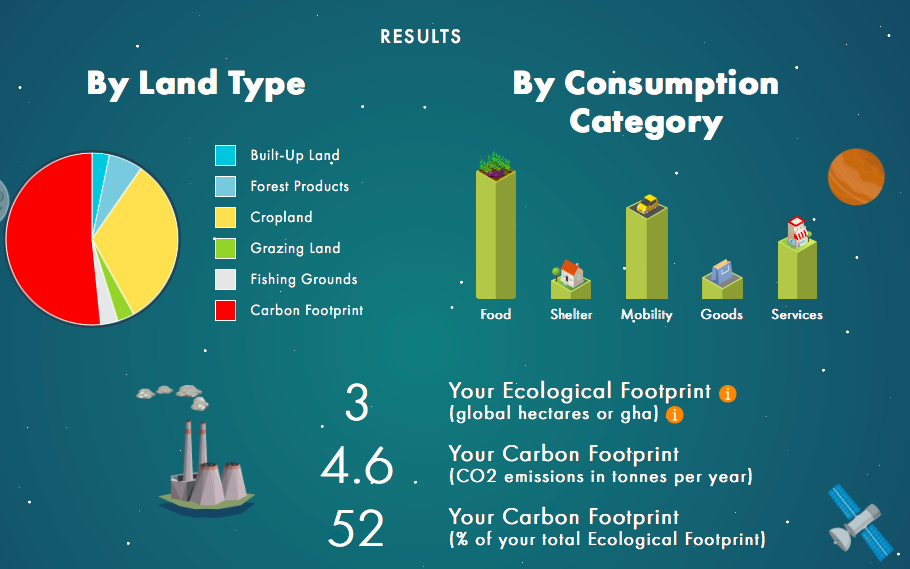
This was my first time taking the Ecological Footprint Quiz. If you haven’t taken it, I highly recommend it! It measures how much nature there is vs. how much we use. To be honest I was expecting it to be much worse. I wasn’t exactly raised in an environmentally conscious family. If I had taken the quiz two years ago, I’m sure the result would have been utterly horrifying. But after coming to Western and being exposed to greener living, I picked up a lot of good habits. I read something in a book recently (Green Giants by E. Freya Williams) and it really surprised me. Apparently people are too embarrassed to live greener because their friends and family or neighbors tease them about it! So they’d rather increase their Ecological Footprint because they want to fit in. I thought it was because of financial issues, like buying organic is expensive.


Even though I’m in the same group as the average American who uses one-and-a-half Earths—far less than the three Earths I was expecting—it is still NOT good. I’m using more resources and faster than the Earth can regenerate. Unsurprisingly my biggest footprint was carbon. I drive down to Seattle once a month to visit family and once to go to visit my cousins in Canada (although they’re much closer).

Three Steps to Reducing Ecological Footprint
- Driving: I plan to drive less to nearby stores that are easily within walking distance or take public transit. Since I’m too lazy to go to the gym, walking 3-4 days a week to and from class should also be good for my health, not just the Earth. I will also avoid traffic as much as I can when I do drive. My car is an ultra-low emission fuel vehicle so I plan to keep it until I get a full-time job and can buy a more environmentally friendly car. This should be good for my carbon emission levels!
- Shopping: Buying organic produce is expensive, especially for a college student. But I can start out with little things, like organic bananas which are only 20 cents more than the regular ones. I will also start to shop locally at the farmer’s market. Then I can move on to shopping at Whole Foods instead of Fred Meyers more often. By starting out with little things, I think I’ll be better able to transition so it won’t feel like I’m spending too much money all of a sudden.
- Food & Water: I will reduce the amount of time I spend in the shower by 3 minutes. I tend to space-out and end up taking longer than necessary. It’s a waste that can be easily remedied (and something my roommates will appreciate). I can also lower the amount of poultry I eat down to 3-4 times a week instead of every day! I will also shift to buying chips, pasta, and spices from Fred Meyer’s Simply Organics line.
My goal is to reduce my Ecological Footprint down to one Earth by the end of the quarter. I’ll be starting slow because I know from personal experience I burn out fast if I start off big. We discussed something similar in a psychology class once and it is very good advice. When you start out with small stuff that’s easy to do, it feels good when you accomplish that goal. Then when you move on to the bigger stuff, it makes it easier to stick to the plan and keep going. I plan to start small and built my way up to the big stuff instead of jumping right in then losing interest.
Update 05/01/18
It’s been three weeks since I began trying to reduce my Ecological Footprint. I’m proud of how successful I have been in implement the changes in my daily life. Here’s how I’ve achieved so far with my goals:
- Driving: Every time I drive I have been carpooling. I have also greatly reduced the number of times I take the bus to and from campus from an average of 12 times a week to having only used the bus 4-5 times since I wrote out this goal!
- Shopping: I have been buying more organics from Fred Meyer’s Simply Organic line. I have a big of an attachment to Fred Meyers so I will probably be slow to move on to Whole Foods Market. I think I will start with small snacks and such.
- Food & Water: My poultry consumption has reduced from every day to ~4 days a week. Next I will try to make it 3 days. My time in the shower has also decreased by 3 minutes. I use the timer on my phone to make to make sure I’m done within 12 minutes instead of 15. I plan to bring it down to 10 minutes now.
On Month After Taking the Ecological Footprint Quiz
New Goal: I am not a big shopper. In fact, I usually dislike shopping (unless it’s for food or books). So the next time I need to buy something, I will do a quick search on Google and see which companies take sustainability seriously. Living in the U.S., it won’t be easy for me to reduce my Ecological Footprint more than what I’ve done so far. I don’t think I can make any more changes in things aside from the food category and shopping category (which I already have goals for).







